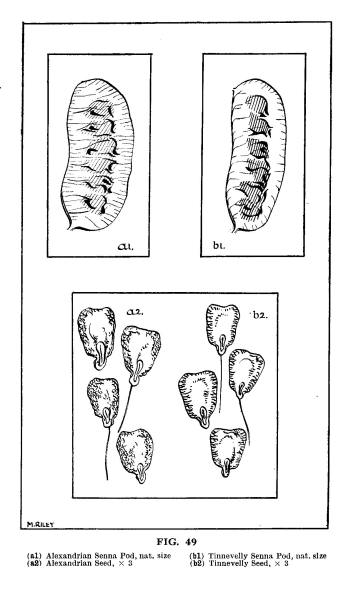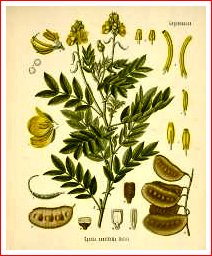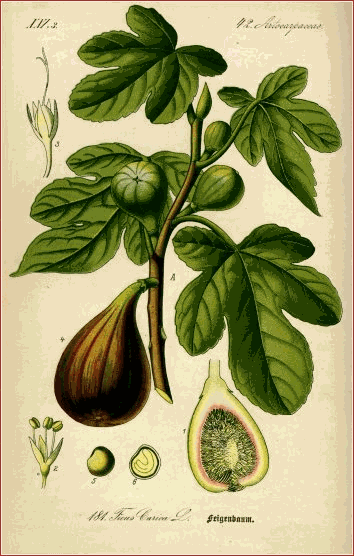

Vegetable Laxatives.
Part 2 of 5.
Compiled and edited by Ivor Hughes
Senna Fruit (B.P.). Senn. Fruct.; Senna Pod; Follicule de Sene;
Sennes-balglein.
Dose: 0.6 to 2 g. (10 to 30 grains).
The dried ripe fruits of Cassia acutifolia (Alexandrian Senna) or Cassia angustifolia (Tinnevelly or East Indian Senna) (Leguminosae), containing not less than 28% of water-soluble extractive. Foreign Pharmacopoeias: In Egyp., Hung., Ind., and Swiss. The following specify C. acutifolia only: Belg., Dan., Nor., and Swed.
Contra-indications. It is contra-indicated in patients with colitis or spastic constipation. Its use should be avoided during pregnancy since it may cause pelvic congestion.
Uses
. Senna fruit is an efficient purgative either for occasional or regular use. Preparations made without crushing the pods are less griping than those made from the leaf, and are free from the after-astringent action of rhubarb purgatives. It exerts its irritant action chiefly on the large intestine, producing purgation 6 to 10 hours after administration. Senna fruit is usually given at bedtime as an infusion prepared by soaking 4 to 12 pods in a cupful of water for 12 hours. The administration of Senna preparations may cause the urine to acquire a yellow colour which changes to red on the addition of an alkali.PURGATIVE ACTIVITY.
The appearance and water-soluble extractive are not reliable indications of the activity of senna pods and leaves. Using a biological method, Alexandrian senna was shown to be more active than Tinnevelly. 60 to 70% of the activity of senna pods and senna leaf is due to anthranol glycosides and the remainder possibly to a 'non-anthracene fraction'. When commercial samples of Liquid Extract of Senna were examined, some contained less than one-tenth the activity of the pod. This low activity was due to incomplete extraction, loss on concentration and loss on storage (especially at elevated temperatures, e.g. 37�). Percolation is the most efficient process of extraction, 3/4 of the activity being extracted with a drug: percolate ratio of 1:6. Loss of activity is avoided by concentrating below 40�. Acetone (70%), alcohol (70%), or methyl alcohol (70%) are suitable solvents. Liquid preparations in water or alcohol do not contain the 'non-anthracene' active fraction, and they deteriorate on storage. Confirmatory evidence was obtained by clinical trial in constipated patients.�J. W. Fairbairn et al., J. Pharm. Pharmacol., 1949, 1, 683; idem, 1950, 2, 807; idem, 1953, 5, 317; Brit. med. J., i/1957, 436.Compound Mixture of Senna (B.P.C.). Mist. Senn. Co.; Black Draught.
Concentrated infusion of senna 8.33 ml., magnesium sulphate 25 g., liquid
extract of liquorice 5 ml., compound tincture of cardamom 10 ml., aromatic
solution of ammonia 5 ml., water to 100 nil.
Dose: 30 to 60 ml. (1 to 2 fl. oz.). A
brisk purgative, producing a soft bulky stool.
 Concentrated Infusion of Senna (B.P.C.). Inf. Senn. Conc.
Concentrated Infusion of Senna (B.P.C.). Inf. Senn. Conc.
Prepared by percolating senna fruit 80 g. with alcohol (20%), adding
strong tincture of ginger 8 ml., and adjusting to 100 ml. with alcohol
(20%).
Dose: 2 to 8 ml. (30 to 120 minims).
Infusion of Senna is prepared by diluting 1 vol. of the concentrated
infusion to 8 vol. with water.
Elix. Senn. (B.P.C. 1949, N.F. 1952). Elixir of Senna; Sweet Essence of
Senna Pods.
Liquid extract of senna 50 ml., sucrose 49.4 g., chloroform 0.21 ml.,
tincture of capsicum 0.21 ml., alcohol (90%) 2.5 ml., water to 100 ml.
Dose: 2 to 4 ml. (30 to 60 minims).
Inf. Senn. Rec. (B.P.C. 1949). Fresh Infusion of Senna.
Senna fruit 10 g., ginger 500 mg., and boiling water 100 g. Infuse in a
covered vessel for 15 minutes and strain.
Dose: 15 to 60 ml. (� to 2 fl. oz.).
Liquid Extract of Senna (B.P.). Ext. Senn.
Liq. A 1 in 1 aqueous extract of senna fruit prepared by maceration with
chloroform water, and containing 0.6% w/v of coriander oil and 25% v/v of
alcohol (90%).
Dose: 0.6 to 2 ml. (10 to 30 minims).
Syrup of Senna (B.P.). Syr. Senn. (B.N.F.). Liquid extract of senna
25% v/v in syrup.
Dose: 2 to 8 ml. (30 to 120 minims).
 PROPRIETARY
PREPARATIONS OF SENNA FRUIT
PROPRIETARY
PREPARATIONS OF SENNA FRUIT
Lixen (Alien & Hanburys). A concentrated extract of senna fruit, available as Elixir and Lozenges. Dose: children 15 drops or more of elixir or � to 1 lozenge; adults, 1 teaspoonful of elixir or 1 to 2 lozenges.
Senokot (Westminster Laboratories'). A stable biologically standardised extract of senna fruit, available as unflavoured Tablets, and as Granules in a basis of cocoa, malt and sugar. For constipation, particularly in chronic cases. Dose: children, � to 1 teaspoonful of granules, or 1 to 2 tablets; adults, 1 to 2 teaspoonfuls of granules, or 2 to 4 tablets.
Senna Leaf (B.P.). Senn. Fol.;
Senna; Feuille de Sene; Sennesblatt; Hoja de sen.
Dose: 0.6 to 2 g. (10 to 30 grains).
The dried leaflets of Cassia acutifolia (Alexandrian Senna) or Cassia angustifolia (Tinnevelly or East Indian Senna) (Leguminosae), containing not less than 30% of water-soluble extractive. Foreign Pharmacopoeias: In all pharmacopoeias examined except Pol. and U.S., but in U.S.N.F. The following specify C. angustifolia only: Dan., Hung., Nor., Span., Steed., and Swiss.
Contra-indications.
It is contra-indicated in patients with colitis or spastic constipation.Uses. As for Senna Fruit. It is often used as Confection of Senna in the treatment of hemorrhoids.
Compound Senna Powder (U.S.N.F.).
Compound Liquorice Powder. Senna 18, liquorice 23.6, washed sulphur 8,
fennel oil 0.4, sucrose 50, all by wt.
Usual dose: 4 g. (60 grains).
Conf. Senn. et Sulphur. (B.P.C. 1949). Confection of Senna and Sulphur.
Equal parts of confection of senna and confection of sulphur.
Dose: 4 to 8 g. (60 to 120 grains).
Confection of Senna (B.P.C.). Conf. Senn.; Lenitive Electuary.
Senna leaf about 9.25%, with coriander, fig, tamarind, cassia pulp,
prune, extract of liquorice, sucrose and water.
Dose: 4 to 8 g. (60 to 120 grains). The
use of coriander oil instead of the fruit has been suggested.
Confection of Senna (Roy. Marsden Hosp.).
Powdered senna leaf 2� gr., powdered jalap root 2� gr., sublimed
sulphur 2� gr., black treacle 60 gr.
Senna Fluidextract (U.S.N.F.).
An alcoholic percolate (1 in 1).
Usual dose: 2 ml. (30 minims).
Senna Syrup (U.S.N.F.).
Senna fluidextract 25 ml., coriander oil 0.5 ml., sucrose 63.5 g., water
to 100ml.
Usual dose: 8 ml. (120 minims).
Species Hamburgenses (Dan. P.).
Senna leaf 62.5 g., manna 25 g., coriander 7.5 g., potassium acid
tartrate 5 g.
Tinct. Senn. Co. (B.P.C. 1949). Compound Tincture of Senna.
Prepared by percolation from senna leaf 20 g., caraway 2.5 g., coriander
2.5 g., glycerin 10 ml., and alcohol (45%) to 100 ml.
Dose: Single, 8 to 16 ml. (120 to 240
minims); repeated, 2 to 4 ml. (30 to 60 minims).
PROPRIETARY PREPARATIONS OF SENNA LEAF
Leniva (Giles, Schacht). A confection of senna as a syrup with a
fruity flavour. Pursennid (known as Glysennid in some
countries) (Sandoz Products). A mixture of equal parts of sennosides A and B
(as the calcium salts) derived from senna leaf, in tablets of 12 mg. For
atonic constipation.
Dose: children of 6 to 12 years 1
tablet, adults 2 tablets at bedtime.
-
Fig (B.P.C.). Ficus; Carica.
Foreign Pharmacopoeias: In Dan. and Swiss. The dried succulent fruit of
Ficus carica (Moraceas). It contains about 50% of sugar, with small amounts
of citric, acetic, and malic acids, and a proteolytic enzyme, ficin. Store
in a dry place.
Uses. A mild laxative and demulcent, used medicinally as
confection or syrup, usually with senna and carminatives.
Compound Syrup of Figs (B.P.C.). Syr. Fie. Co. (B.N.F.); Aromatic Syrup
of Figs. Prepared from fig 32 g., compound tincture of rhubarb 5 ml.,
liquid extract of senna 10 ml., elixir of cascara sagrada 5 ml., sucrose 54
g., and water to 100 ml. A mild pleasant laxative for children.
Dose: 2 to 8 ml. (30 to 120 minims). The
B.N.F. directs that this syrup be dispensed when Syrup of Figs is
prescribed.
Syr. Fic. (B.P.C. 1934). Syrup of Figs.
Add fig, cut small, 40 g. to 100 ml. of boiling water and digest at a gentle
heat for 1 hour; strain, express, and wash pulp with sufficient warm water
to produce 100 ml.; evaporate to 50 ml., dissolve sucrose 67-5 g., and
adjust to 100 ml. with water.
Dose: 2 to 8 ml. (30 to 120 minims).
Part 1. Part 3. Part 4. Part 5.
![]()